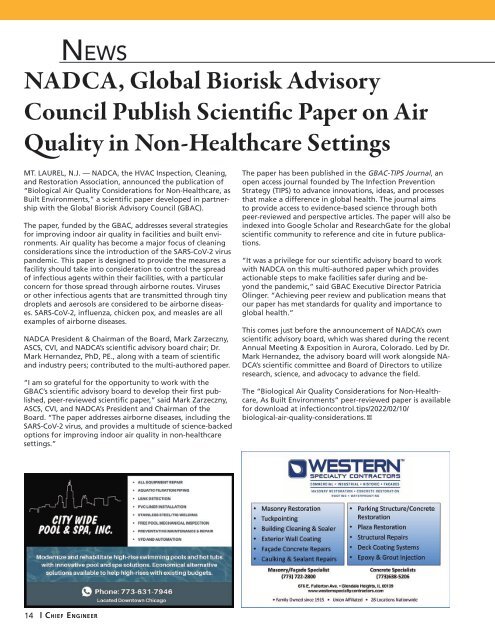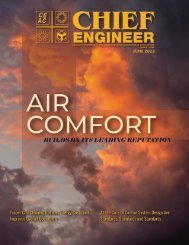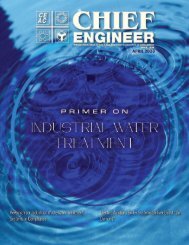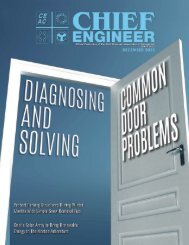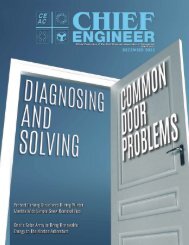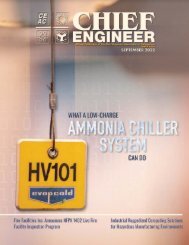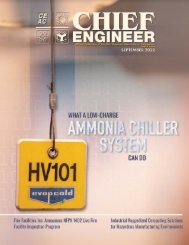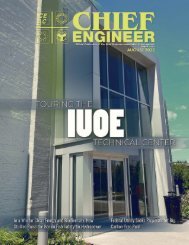CEAC-2022-05-May
You also want an ePaper? Increase the reach of your titles
YUMPU automatically turns print PDFs into web optimized ePapers that Google loves.
News<br />
NADCA, Global Biorisk Advisory<br />
Council Publish Scientific Paper on Air<br />
Quality in Non-Healthcare Settings<br />
MT. LAUREL, N.J. — NADCA, the HVAC Inspection, Cleaning,<br />
and Restoration Association, announced the publication of<br />
“Biological Air Quality Considerations for Non-Healthcare, as<br />
Built Environments,” a scientific paper developed in partnership<br />
with the Global Biorisk Advisory Council (GBAC).<br />
The paper, funded by the GBAC, addresses several strategies<br />
for improving indoor air quality in facilities and built environments.<br />
Air quality has become a major focus of cleaning<br />
considerations since the introduction of the SARS-CoV-2 virus<br />
pandemic. This paper is designed to provide the measures a<br />
facility should take into consideration to control the spread<br />
of infectious agents within their facilities, with a particular<br />
concern for those spread through airborne routes. Viruses<br />
or other infectious agents that are transmitted through tiny<br />
droplets and aerosols are considered to be airborne diseases.<br />
SARS-CoV-2, influenza, chicken pox, and measles are all<br />
examples of airborne diseases.<br />
NADCA President & Chairman of the Board, Mark Zarzeczny,<br />
ASCS, CVI, and NADCA’s scientific advisory board chair; Dr.<br />
Mark Hernandez, PhD, PE., along with a team of scientific<br />
and industry peers; contributed to the multi-authored paper.<br />
“I am so grateful for the opportunity to work with the<br />
GBAC’s scientific advisory board to develop their first published,<br />
peer-reviewed scientific paper,” said Mark Zarzeczny,<br />
ASCS, CVI, and NADCA’s President and Chairman of the<br />
Board. “The paper addresses airborne diseases, including the<br />
SARS-CoV-2 virus, and provides a multitude of science-backed<br />
options for improving indoor air quality in non-healthcare<br />
settings.”<br />
The paper has been published in the GBAC-TIPS Journal, an<br />
open access journal founded by The Infection Prevention<br />
Strategy (TIPS) to advance innovations, ideas, and processes<br />
that make a difference in global health. The journal aims<br />
to provide access to evidence-based science through both<br />
peer-reviewed and perspective articles. The paper will also be<br />
indexed into Google Scholar and ResearchGate for the global<br />
scientific community to reference and cite in future publications.<br />
“It was a privilege for our scientific advisory board to work<br />
with NADCA on this multi-authored paper which provides<br />
actionable steps to make facilities safer during and beyond<br />
the pandemic,” said GBAC Executive Director Patricia<br />
Olinger. “Achieving peer review and publication means that<br />
our paper has met standards for quality and importance to<br />
global health.”<br />
This comes just before the announcement of NADCA’s own<br />
scientific advisory board, which was shared during the recent<br />
Annual Meeting & Exposition in Aurora, Colorado. Led by Dr.<br />
Mark Hernandez, the advisory board will work alongside NA-<br />
DCA’s scientific committee and Board of Directors to utilize<br />
research, science, and advocacy to advance the field.<br />
The “Biological Air Quality Considerations for Non-Healthcare,<br />
As Built Environments” peer-reviewed paper is available<br />
for download at infectioncontrol.tips/<strong>2022</strong>/02/10/<br />
biological-air-quality-considerations.<br />
14<br />
| Chief Engineer


